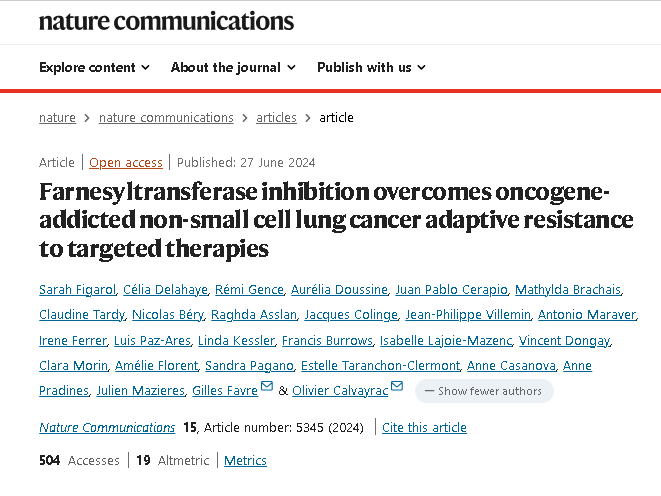Olivier Calvayrac, Research Scientist at the Toulouse Cancer Research Center, shared a post on X about a recent paper by Sarah Figarol et al. titled “Farnesyltransferase inhibition overcomes oncogene-addicted non-small cell lung cancer adaptive resistance to targeted therapies” published in Nature Communications:

Olivier Calvayrac commented on X sharing the paper:
“It’s finally out!! Thrilled to share our new paper, out today at Nature Communications! Targeted therapy (TT)-derived drug-tolerant (DT) lung cancer cells are vulnerable to farnesyltransferase inhibitors (FTI)! Check out how we got there.
We first addressed the kinetics of entry/exit from the DT state in different clonally-derived, genetically homogenous models of oncogene-addicted NSCLC treated with TT. Real-time monitoring of the cell cycle dynamics using the FUCCI system revealed a highly dynamic state!
After an initial p27/pRb-dependent cell cycle arrest, a rare fraction of proliferating cells emerged among a stably arrested, progressively dying cell population. We collected those ‘early escapers’ together with G1-arrested cells to perform scRNAseq.
We observed a deep lineage reprogramming involving the emergence of an alveolar-type 1 (AT1) phenotype restricted to G1-arrested cells, and a mesenchymal phenotype in early escapers. Pseudotime analysis suggests that mesenchymal cells may have evolved from AT1-like cells.
Among almost 30,000 Human Molecular Signatures Database (MSigDB) gene sets tested, AT1 was one of the only 3 signatures that was invariably associated with DT in all our models! The other 2 were related to muscle contraction, which strongly influenced the rest of the study…
We used these transcriptomic data to build 2 signatures of drug-tolerance: 212 commonly upregulated and 495 downregulated genes. These DTC signatures were associated with healthy lungs vs tumors, as were AT1 and muscle-related signatures: DTC look like normal lung cells!
We next focused on the ‘muscle’ part of the phenotype, and we observed a highly reorganized actin cytoskeleton in all the models of DTC evidenced by the presence of actin stress fibers and activation of the Rho/ROCK pathway.
We obviously aimed to block this pathway using a panel of inhibitors. Although most of them interfered with the adaptive response to TT, only farnesyltransferase inhibitors (FTI) such as tipifarnib, completely prevent the development of resistances in all the models tested!
CRISPR/cas9-mediated genetic depletion of the beta subunit of farnesyltransferase (FNTB) also prevented relapse to osimertinib in vivo in an EGFR-mutant NSCLC model, excluding a potential off-target effects of the drug.
In vivo combination with the FTI tipifarnib efficiently prevented relapse to osimertinib in EGFR-mutant PDX models but also to sotorasib in KRASG12C-mutant PDX models. Importantly, combinations were well tolerated by mice (with co-treatments running for up to 6 months!)
We identified unfolded protein response (UPR)/integrated stress response (ISR) as the stress pathway responsible for cell death in response to FTI+TT combinations. These combinations also induced mitotic defects, that couldn’t be resolved by tumor cells which ended up dying.
Tipifarnib broadly interfered with the DT phenotype by decreasing DTC-associated genes and signatures. It could also affect cytoskeletal remodeling, although this was highly dependent on the model. Stress-fiber formation appears to be a hallmark but not a vulnerability of DTC.
There is still a lot to do to understand the molecular mechanisms underlying tumor cell plasticity in response to anti-cancer therapies. The study of the farnesylated proteins involved during the adaptive response to TT should provide important insights. To be continued…
I would like to thank all our funders for their support: Inserm, CNRS, Fondation Toulouse Cancer Santé. Labex Toucan, Institut national du cancer, Fondation pour la Recherche Médicale, La Ligue contre le cancer, IUCT Oncopole, alk ros1 france cancer poumon, Kura Oncology, Fondation ARC.
Last but not least: an enormous thanks to all the people involved in this work, especially the first authors Figarol Sarah and Delahaye Célia, co-corresponding author Gilles Favre, and all the members of the Favre/Sordet team, CRCT-Oncopole. Thank you!”
Source: Olivier Calvayrac/X










